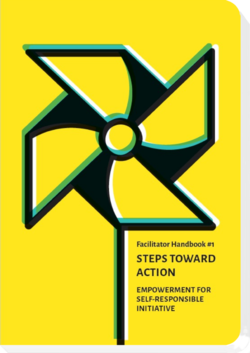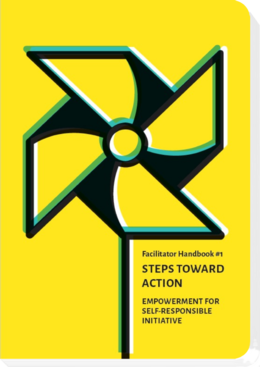Contents
The Framework
Competendo proposes a model that proved in different educational contexts, inspired by the competence model of the German Federal Institute for Vocational Education and Training.
Competendo Key Competences | |
|
Abstract Competences | |
|
Task-specific Factual Competence |
Identifying adequate solutions for tasks and problems on the basis of knowledge about the specific field, and how it is systematically related within its field and to other fields. |
|
Methodological Competence |
Acting consciously, adequately and in a goal-oriented way. An ability to choose methodologies and to evaluate outcomes. |
|
(Inter)Personal competences | |
|
Social Competence |
Living in relation to other people and acively shaping social relations. Reflecting different interests, needs and tensions. Team and conflict management skills. |
|
Personal Competence |
Acting autonomously in a selforganized and reflective way: Observing and evaluating challenges, requirements, or options. Assuming responsibility. |
Tools for planning
- A tool for an overview of different competence frameworks: Competence Explorer
- PDF Template: File:Template-key-competencies.pdf
- Task: Key Competence Profile
Describing Competences by Using Active Words
Active Wordsanalyze justify explain |
Lazy Wordsgetting familiar perceive getting to know with |
Lazy words are describing lazy people. Without mobilizing any energy I can perceive something or become familiar with a topic. The following table of active words might offer inspiration for replacing them:[2]
Act Apply Analyze Argue for.. Assess Assume | Categorize Check Choose Collaborate Collect Combine Compare Conceptualize Construct Connect Conclude Criticize | Discuss Distinct Decide Design Develop Diagnose | Estimate Evaluate Explain Express Experiment | Find out Formulate | Illustrate Include Interact Implement | Judge | Label List Localize | Observe Organize Outline | Plan Present | Reflect Repeat Reproduce Remember | Shape State Sketch Solve Support | Test Transfer | Understand Use | Validate Verify |
Case Study: Empowerment through a Volunteer Project
Organizing a small local project can lead to the development of skills, attitude and knowledge in the organizers and the target group. A team organized an environmental workshop for young people. The participants decided to organize a cleaning event in a nearby forest, where they and their neighbors collected garbage.
Now the team examines the chart of the key competences and tries to describe the educational impact of this project. For your organization, you could define such levels of competence development with the help of this model with greater precision.
This will help you to understand your impact as an organisation or learning provider better.
|
Example: Acting as an active citizen |
Example: Planning skills |
|
Topical expertise |
Knowledge about:
|
Knowledge about:
|
Methodological competence |
|
|
Social competence |
|
|
Personal competence |
|
|
After: German "Federal Institute for Vocational Education and Training" (BIBB): K. Hensge, B. Lorig, D. Schreiber: Kompetenzstandards in der Berufsausbildung; Abschlussbericht Forschungsprojekt 4.3.201 (JFP 2006)
References
- ↑ Federal Institute for Vocational Education and Training (BIBB): K. Hensge, B. Lorig, D. Schreiber: Kompetenzstandards in der Berufsausbildung; Abschlussbericht Forschungsprojekt 4.3.201 (JFP 2006)
- ↑ Olivia Vrabl: Schritt-für-Schritt-Anleitung zur Formulierung von Lernergebnissen (intended learning outcomes) in: Johann Haag, Josef Weißenböck, Wolfgang Gruber, Christian F. Freisleben-Teutscher (Ed.): Kompetenzorientiert Lehren und Prüfen; Basics – Modelle – Best Practices; Tagungsband zum 5. Tag der Lehre an der FH St. Pölten am 20.10. 2016; p. 15ff.
Handbook for Facilitators: Steps toward Action
M. Gawinek-Dagargulia (ed.), N. Zimmermann (ed.), E. Skowron (ed.) (2016). Steps toward action. Empowerment for self-responsible initiative. Help your learners to discover their vision and to turn it into concrete civic engagement. Competendo Handbook for Facilitators.

Nils-Eyk Zimmermann
Editor of Competendo. He writes and works on the topics: active citizenship, civil society, digital transformation, non-formal and lifelong learning, capacity building. Coordinator of European projects, in example DIGIT-AL Digital Transformation in Adult Learning for Active Citizenship, DARE network.
Blogs here: Blog: Civil Resilience.
Email: nils.zimmermann@dare-network.eu








